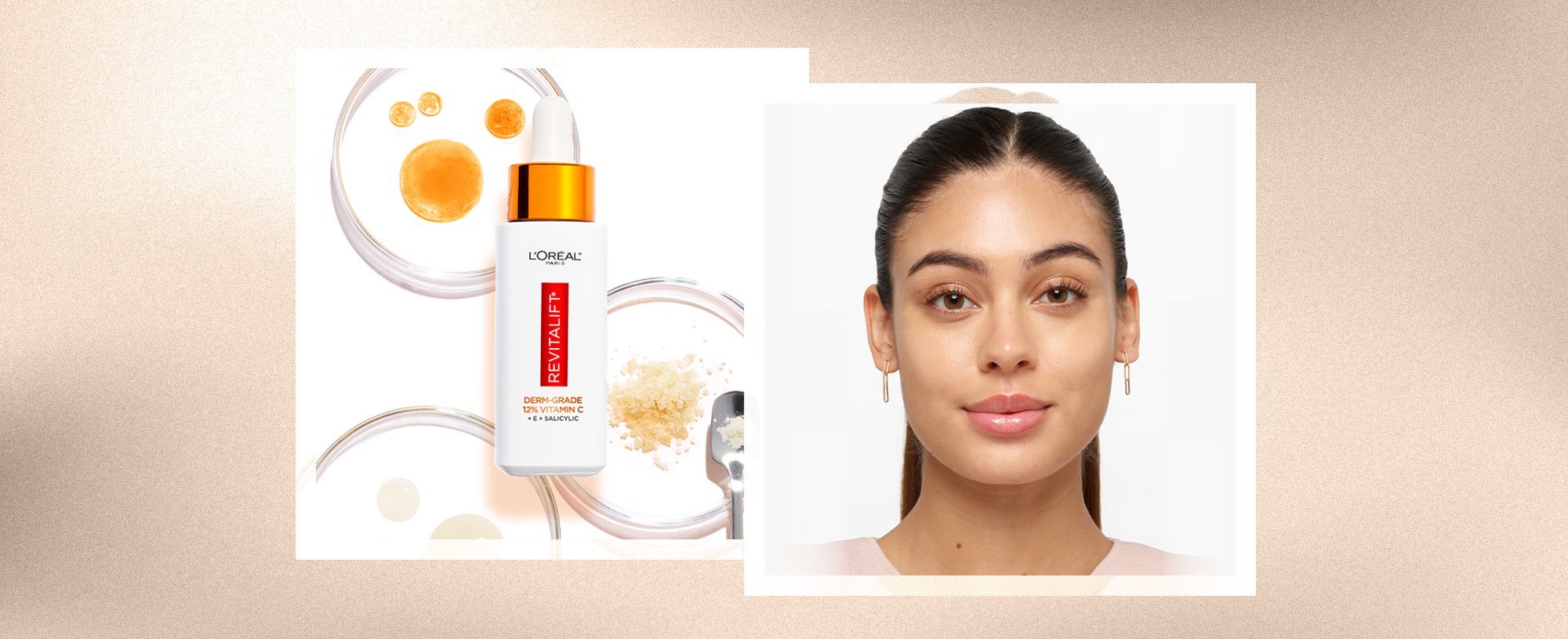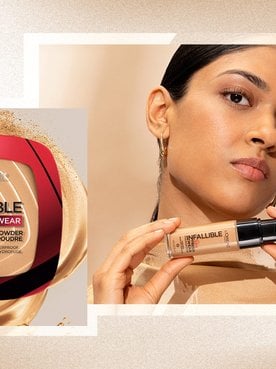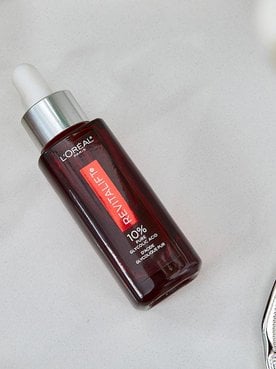Scour the shelves of any skincare enthusiast, and you’re likely to find a vitamin C serum (or several) amongst their impressive lineup. There’s a reason for this: While the ingredient widely known for its ability to help brighten dull skin, vitamin C serum benefits for your complexion extend far beyond that.
Here, we’ll explain some of the most notable benefits of vitamin C for skin (some of which may seriously surprise you). Then, we’ll detail how and when to use vitamin C serum in your routine to promote a brighter, healthier-looking complexion.
What Does Vitamin C Do for Your Skin?
Topical vitamin C can help address a range of skin concerns, from dark spots and discolorations to fine lines and dullness. But before we explain why, a little context is needed.
No matter how old you are, there’s no stopping the passage of time—and your skin is perhaps the most visually obvious indicator of your advancing years. As you age, your body begins to produce less collagen and elastin, two proteins that give your skin structure. Over time, this can result in fine lines and wrinkles, sagging, and changes in your skin’s texture. Topical use of vitamin C, according to the Cleveland Clinic, can help boost collagen, which in turn promotes a more youthful appearance. Vitamin C serums can also help brighten the skin, making it appear more radiant, even, and youthful.
The reason many experts (including those at the American Academy of Dermatology) recommend using a vitamin C serum is because serums tend to be more concentrated than toners or cleansers. That said, you can reap similar benefits from consistent use of a vitamin C-infused moisturizer or essence, too.
Vitamin C Serum Benefits
As we’ve mentioned, vitamin C serum benefits can vary from product to product. Some are formulated to visibly brighten skin, while others might slot perfectly into a routine for blemish-prone skin. These benefits also may not be entirely attributed to vitamin C, as serums are made with a blend of different ingredients, each part playing its own role.
There are, however, certain benefits associated with vitamin C itself. Below, we’ll dig into some of these notable vitamin C benefits for skin.
Helps reduce the appearance of dark spots
Dark spots can develop after a nasty breakout, with repeated sun exposure, or even simply the passage of time. Using a vitamin C serum can help prevent these dark spots from forming and brighten the appearance of existing spots, according to research published in the Journal of Clinical and Aesthetic Dermatology.
Brightens skin’s tone
By minimizing the appearance of dark spots and discoloration, vitamin C can help give the skin a more uniform, radiant appearance. It’s this benefit that makes vitamin C serums a staple in skincare routines for dull skin, though how well a given serum brightens the skin depends on the specific formula of the product.
Can help smooth skin texture
As we mentioned earlier, fine lines, wrinkles, and sagging skin are all part of the natural aging process. Skincare products with vitamin C may help to improve the appearance of these concerns, however, and give the skin a firmer, smoother appearance.
Improves the look of dark under-eye circles
Some vitamin C serum uses include improving the appearance of dark circles. Vitamin C works to brighten the skin, minimizing the look of discoloration to reveal a fresher, more rested appearance. However, if you plan to use vitamin C around your eye area, be sure to use a formula specifically designed for that purpose. We love the L'Oréal Paris RevitaLift Triple Power Eye Treatment, which contains pro-retinol, vitamin C, and hyaluronic acid and helps reduce wrinkles, de-puff, and brighten the eye area.

Offers antioxidant protection
Vitamin C is a powerful antioxidant that helps neutralize free radicals caused by environmental exposure. This added layer of protection can slow signs of aging and reduce stress on your skin. Think of it as armor against pollution and UV damage. That's why the broad-spectrum L'Oréal Paris RevitaLift Triple Power Moisturizer with SPF 30 includes vitamin C in its formulation. It helps boost your skin's radiance while maintaining moisture levels and protecting it from the harmful effects of sun exposure.

Shop the Products
Helps reduce redness
With regular use, vitamin C serum can help calm visible redness and even out blotchy skin. Its anti-inflammatory properties make it a great choice for sensitive or reactive skin types. This benefit is especially noticeable in people dealing with blemishes or irritation. That being said, if your skin is especially sensitive, you may want to consult with your dermatologist before adding a vitamin C serum to your routine.
Supports the skin barrier
The key to healthy skin lies in a strong, intact protective skin barrier. This shield (of sorts) helps maintain your skin’s moisture levels and keep potentially harmful microorganisms out. It also helps protect you from environmental stressors, like UV radiation, and aids in regulating your body temperature. There are a lot of elements to the skin barrier, but one of the key compounds is—you guessed it—vitamin C. Using vitamin C serums may help support this all-important barrier to promote healthy-looking (and healthy-feeling) skin.
Pairs well with other anti-aging ingredients
Another reason to love vitamin C serums is that they layer well with other skincare staples, such as hyaluronic acid and niacinamide. Together, they can hydrate, firm, and brighten all at once. Just avoid pairing it with strong acids or retinol unless advised by a dermatologist.
Are Vitamin C Serums and Concentrates the Same Thing?
The truth is, there isn’t much of a difference between a vitamin C serum and a vitamin C concentrate. It’s up to you (and the marketing teams behind your favorite products) whether you want to refer to your lightweight, highly-concentrated product of choice as a serum or a concentrate. Either way, your skin will thank you for the extra love.
When Should You Use a Vitamin C Serum?
You can use vitamin C serum in the morning, evening, or both, depending on your skin’s needs and tolerance. Most people prefer applying it in the morning to take advantage of its protective properties against daily stressors like pollution and sun exposure. Just be mindful when layering: apply vitamin C serum after toner and before moisturizer or SPF for best results.
Avoid layering vitamin C serum with retinol or potent exfoliating acids (like glycolic or salicylic acid) unless they’re part of a specially formulated combo. Mixing them on your own can cause irritation, especially if you have sensitive skin. If you want to use both, try alternating days or using one in the morning and the other at night.
How often should you use vitamin C serum?
If you’re new to vitamin C serum, start by using it a few times a week to see how your skin responds. Once your skin adjusts, you can increase usage to once daily, ideally in the morning for its antioxidant protection. For enhanced hydration and skin barrier support, consider following up with a gentle moisturizer like the L'Oréal Paris RevitaLift Micro Hyaluronic Acid + Ceramides Line-Plumping Water Cream, which works especially well with vitamin C serum to deliver smooth, glowing, and well-moisturized skin.
Shop the Product
Top L'Oréal Vitamin C Serums and Moisturizers To Add to Your Skincare Routine
Not all vitamin C serums are created equal. The best ones combine effective concentrations with skin-loving extras like hydration and exfoliation. Here are three standout vitamin C products from L’Oréal Paris.
L'Oréal Paris RevitaLift 12% Pure Vitamin C + E + Salicylic Acid Serum
If you’re looking to smooth the appearance of lines, reduce the look of enlarged pores, and instantly give your skin a radiant glow, give this unique vitamin C serum a try. With a blend of potent 12% pure vitamin C (L-ascorbic acid), salicylic acid, and vitamin E, this non-greasy, fast-absorbing formula leaves skin looking brighter, smoother, and more youthful in just weeks.

L’Oréal Paris RevitaLift Triple Power Age-Defying Serum
Vitamin C, hyaluronic acid, and a tri-peptide complex join forces in this potent anti-aging serum. The unique formula, which is suitable for all skin types, instantly hydrates and smooths the skin. Use it daily, meanwhile, and you’ll enjoy a firmer, plumper, more even-looking complexion over time.
L'Oréal Paris Bright Reveal Vitamin C Glow Moisturizer
If you prefer a two-in-one option, this unique moisturizer combines vitamin C serum benefits with long-lasting, lightweight hydration. It instantly boosts radiance, while continued use helps brighten, smooth, and refine the skin. Plus, the dermatologist-tested formula is suitable for all skin types and non-comedogenic, so it can slot well into nearly any skincare routine.

Shop the Products
How To Apply Vitamin C Serum
To get the most out of your vitamin C serum, apply it in the right order and pair it with complementary products. Here’s how to do it right.
Step 1: Cleanse
Start your routine by lathering up with a gentle, non-stripping facial cleanser, such as the L'Oréal Paris RevitaLift Radiant Smoothing Cream Cleanser. This step helps remove excess oil and impurities, which can help to ensure maximum absorption of your vitamin C serum.
Step 2: Apply vitamin C serum
Next, dispense a few drops of your chosen vitamin C serum into your palms and gently press it into your skin. Focus on areas with uneven tone or texture. Let it absorb fully before continuing.
Step 3: Moisturize
Follow with the L'Oréal Paris Bright Reveal Vitamin C Glow Moisturizer to lock in hydration and add an extra dose of brightness. It complements your serum while keeping skin soft and smooth. Massage it in using upward motions.
You can also try the L'Oréal Paris RevitaLift Micro Hyaluronic Acid + Ceramides Line-Plumping Water Cream for a boost of hydration and skin barrier support. This cream helps visibly plump fine lines while reinforcing the skin’s moisture barrier, making it an ideal follow-up to vitamin C serum. When used together, they create a powerhouse combo that delivers both brightness and long-lasting hydration.
Shop the Products
Step 4 (daytime): Apply SPF
In the morning, complete your routine by applying a broad-spectrum sunscreen with an SPF of at least 15 to shield your skin from damaging UV rays. Remember to reapply your sunscreen every two hours (more frequently if you’re sweating or swimming) and be sure to seek shade whenever possible to keep your skin well-protected.
Next Up: Why the L’Oréal Midnight Cream Is Your Beauty Sleep in a Jar
Photo courtesy of L’Oréal Paris







